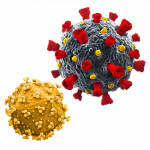You wouldn’t have to watch Bravo to know that Annette Lizzul, 41, was in serious need of a makeover. And fast. A veteran of the HIV wars on something like her tenth combo (“I’ve lost count,” she said), Annette seemed the perfect Eliza to POZ’s Henry Higgins. But was she game? “Yes,” she answered, in a sweet, gravelly voice. “Definitely, yes!” Last fall, Annette breezed into our offices shrouded in black—her hair unkempt, a sad look in her eyes. And why not? The disease had taken her lover in 1985 (he had hidden both his drug use and his HIV status from her). Over the next 14 years, it proceeded to claim her income and independence, her sex life, her self-esteem and nearly her sanity.
Then things got bad. In 1999, Annette walked straight into a health-crisis minefield—cytomegalovirus, which dimmed her vision; a cancerous tumor on her finger; a violent reaction to Ziagen that landed her in the hospital. Lipodystrophy had thinned her limbs and left fatty deposits on her chin and upper back; chemotherapy had savaged her coif. Yet as we talked, the New Jersey native seemed vital, unsuppressible. After an up-close-and-personal consultation, POZ and Annette decided what she must change: everything. She needed not only a new look and a better body but help with all the bread-and-butter issues, including insurance, a job, a home away from her parents. And a little romance wouldn’t hurt. Looking us right in the eye, Annette said, “Make me a whole new woman.”

Annette Lizzul, styling by Jeremy TjhungRob Mandolene
LOOKIN’ good
Chemo had given Annette a few bad-hair years—and now she was letting it grow out. At POZ’s request, Gabriel San Emeterio of New York City’s Robert Kree salon stepped in—and persuaded her to chop the dark locks. His goal: Draw admirers to her awesome eyes and cheekbones—and away from that “problem” chin area, caused by lipodystrophy. The cut also tamed Annette’s curls, a post-chemo development. “Short hair makes my face look slimmer,” Annette said. “I’ll go back to Gabriel—and may even add some color.” POZ then deployed crack makeup artist Jackie Catanese, who accentuated Annette’s eyes with false lashes and camouflaged her chin with subtle shading tricks. “I’ll probably wind up in the emergency room trying to put on false eyelashes myself,” Annette said afterward. “But I’m going to try. The session made me feel so good about myself that I’ve been putting on makeup every day. I feel great and it shows.”
Next, under stylist Jeremy Tjhung’s expert eye, Annette chose a new wardrobe palette: rich burgundies and reds. Tjhung also prescribed a tailored fit to make her look trimmer. “She has a wide rib cage but slim hips and wears things oversized on top because they feel more comfortable,” Tjhung said. “But a wide-set shoulder on a garment makes you look wider, especially without a defined waist.” (As Catanese put it, “If you got a rack, show it off, baby.”) Tjhung lured Annette into the highest heels possible, giving her a great line. In stilettos and a V-neck velvet dress, Annette looked runways away from the woman we’d first met last fall. “It felt wonderful to have someone choose clothes they thought would flatter me,” Annette said. “I usually pick things that are black, loose and boring. The pink blouse and colorful jacket made me feel happier.”
MOVIN’on out
Gaining confidence, Annette began feeling ready to spread her wings. To cut costs, she had long ago moved in with her parents. “I’m dying to live on my own again,” Annette said. “I know it’s going to be hard after being cared for for 18 years. As crazy as it sounds, I want to be uncomfortable. I want to be lonely. I may get sick trying to cook for myself, but that’s OK.” She had investigated local HUD-sponsored subsidized housing programs, Section 8 and Housing Opportunities for Persons with AIDS (HOPWA), which wait-listed her. She hoped a new salary would snag her modest digs near New Jersey’s Hyacinth AIDS Foundation, where she had applied for a job after much volunteering. “Ideally, I’d like to find a complex full of younger singles,” she said. POZ sent Annette to the Housing Coalition of Central Jersey, a HUD-certified nonprofit. “We’ll look at her resources, employment and earning potential, and determine what she can afford and what programs she qualifies for,” executive director Linda Jay said. Annette’s counselor will get her on the right lists, give her access to a database of affordable options and help her choose a neighborhood. “It’s very tricky,” said Jay. “In this area, the vacancy rate is less than one percent and rents average $800 to $900 a month. Finding housing takes perseverance on all sides.”
Habitat for HIVers:
Sky-high real-estate prices increasingly leave many HIVers out in the cold. Subsidized housing options for people with HIV and limited income offer a warm alternative.
HOPWA GRANTS help PWAs on a tight budget. But the 75-city program is drastically underfunded and has long wait lists. “We see movement only when people get evicted or pass away,” Angel Vargas,Hyacinth’s HOPWA coordinator, told us.
HOUSING-CHOICE VOUCHERS (formerly Section 8) also serve people with disability or limited income. Again, demand far exceeds funding, and long lines see movement only for brief application periods advertised in local newspapers.
The HUD website (www.hud.gov) offers user-friendly info on HOPWA, housing-choice vouchers and other subsidies; public housing agencies; and general renting and buying. Find a local housing-counseling agency at www.hud.gov/offices/ hsg/sfh/hcc/hccprof14.cfm, call 800.569.4287 or enlist an ASO (AIDS service organization) case manager (www.thebody.com/hotlines/other.html).
WORK it, girl
Employment, of course, is the easiest route to a room of one’s own. When POZ met Annette, she was earning about $1,500 a month on public disability and volunteering at Hyacinth. While we were helping her find a career counselor and explore grad-school options, Hyacinth came through with a permanent part-time position. “I couldn’t believe they created a job for me,” Annette said. “I hugged the director.” She negotiated her salary (about $18,000), and Social Security’s Ticket to Work program will continue her disability for a nine-month trial and designated periods thereafter. Annette is aiming to ditch disability—eventually. But Jeff Rindler, assistant director of work-force development at Gay Men’s Health Crisis (GMHC), cautioned her to “ease back into things.” His advice for adjusting to her increased hours: “Continue to take care of yourself, take breaks, don’t skip lunch, and keep protein snacks at your desk.”
On the Job
Consult your doc and join a support group before returning to work—to meet folks who’ve made the leap, GMHC’s Jeff Rindler told us. “Deciding not to re-enter the job market after weighing the pros and cons might be the most loving thing you can do for yourself.”
Volunteering is a great way to test the waters, Rindler said.“Start two days a week and see how it feels to get up and work four or five hours in a row.”
Check with your insurer or ASO (www.thebody.com/hotlines/other.html)to learn how new income will affect your benefits. If you’re on public assistance, contact your state’s Benefits Planning Assistance Outreach Program (BPAO) at www.-yourtickettowork.com/bpao or 866.968.7842.
Find job-readiness training at your local ASO or a Social Security employment network at www.yourtickettowork.com/endir or 866.968.7842. Back-to-work programs help sharpen your resume, confidence and interview outfit.
Do not disclose your HIV status. “If candidates are equal,employers will choose the one who’s not positive, so they don’t have to worry about health or ability to handle the work,” said GMHC assistant director of legal services and advocacy Debra Wolf. The law prohibits asking applicants anything unrelated to job suitability, such as HIV status.
Prepare to explain the gaps in your résumé. “If you took classes or pursued an artistic interest, talk about that,” Wolf said.“Don’t lie—but consider ways to avoid answering directly.”
“Once you’re hired, don’t disclose unless you have to,” Wolf said. “If you’re requesting special accommodation, medical leave or disability, see a counselor first to ensure your privacy.”
See your doctor regularly, reporting any symptoms. If you’re called to a Continuing Disability Review, the records will substantiate your condition.
Beware Social Security overpayments. If you return to work, you could get erroneous checks—and have to repay.
Take sick days as needed. After 12 months at work, the Family Medical Leave Act (www.fmla.gov) allows employees up to 12 weeks’ medical leave.
INSURANCE assurance
Style, shelter and a salary won’t mean squat if Annette can’t afford her meds. Laid off in ’01, she had kept her health coverage via the Consolidated Omnibus Budget Reconciliation Act (COBRA)—until her former employer folded. (A company must have an active policy for COBRA laws to apply.) Her premiums, annual deductible and $600-monthly-prescription copays were crippling, however. So Annette sought the services of New Jersey’s AIDS Drug Assistance Program (ADAP), which provides HIV-related prescriptions to the un- and underinsured. ADAP covered her meds, and New Jersey’s Health Insurance Continuation Program (HICP) handled her insurance premiums until the job at Hyacinth came through with full coverage.
Though Hyacinth now pays most of Annette’s insurance (removing her from HICP consideration), she still must pony up a portion of her premiums (albeit much lower than private insurance). ADAP will continue to cover her meds as long as her salary remains below New Jersey’s $44,900 cap.
“Learning how new income will affect your benefits before you take a job is a good idea,” Frank Cevasco, coordinator of GMHC’s legal services and client advocacy department, told us.
Going Under Cover
Health insurance premiums and copays can empty a bank account fast—but going uninsured is no answer either. Emergency stopgaps can help HIVers who need coverage now.
AIDS Drug Assistance Programs (ADAPs) provide HIV-related prescription drugs to the low-income un- and underinsured. The federal program is administered locally, and state programs vary. Many ADAP shave insufficient funds to assist all qualifiers, so expect waiting lists, strict eligibility criteria and limited drug formularies. For info on your state’s ADAP, visit www.atdn.org/access/index.html; for general ADAP information: www.projinf.org/org/ADAP.html.
Health Insurance Continuation Program (HICP) pays monthly premiums for ADAP-eligible HIVers in New Jersey. Not all states offer similar programs. To find out if yours does, click on “ADAPs” at www.aegis.com/factshts/network/access/index.html.
For more about COBRA, drop by www.cobrainsurance.com. Your local ASO (www.thebody.com/hotlines/other.html) can also answer coverage questions.
PRESSING the flesh
Clothes may make the woman—but no more so than what lies beneath. So POZ took a peek. Though stopping Crixivan lessened the fat deposits on her back and chin, Annette wanted them gone. She consulted plastic surgeon Gregory Rauscher, MD, of Hackensack, NJ, who computer-edited a photo to show the likely benefits. Encouraged, she plans to raise the $2,500 fee by factoring a “savings for surgery” into her budget.
Meanwhile, Annette will pursue the medical and cosmetic benefits of exercise. “I always say, I’m a ‘thin-fat girl.’ I have a big torso, and skinny legs and arms. I’d like to change that.” Too sick to work out regularly over the past few years, Annette now is up for the challenge. POZ pointed her to Nelson Vergel, executive director of the Program for Wellness Restoration in Houston, who told us, “HIVers should consult their doctor and a nutritionist before starting to exercise—and it’s best to work with a trainer who knows HIV.” He advised Annette to begin with 20-minute walks to build up energy, and after a few weeks to combine low-impact cardio, light weight-training and yoga. “Keep workouts under an hour, no more than four times a week, or you can weaken the immune system,” Vergel said. “I’ve seen huge miracles with proper exercise. People get their lives back.”
LOVE we deliver
Annette will soon have her own pad—how ’bout a special guest to go with it? Before getting HIV and losing the love of her life, she had had little dating experience. “It’s been hard,” she says. “I’ve had bad experiences disclosing my HIV, so I’ve been afraid to date nonpositive men. But many positive straight guys are ex-drug users—and because of Larry, I’m afraid of them.”
Slinking back on the social scene can shake even the most confident HIVers. With our encouragement, Annette agreed to hit the Big Apple for a mixer for hetero HIVers. (“Maybe I’ll meet a nice hemophiliac,” she joked.) Going solo was adventurous for a girl who rarely left home, so Annette had friends meet her there. After paying the $20 admission, she looked around at the handful of people, many much older and in worse shape than herself.
Taking a deep breath, she headed to the bar. When her friends arrived, she asked the host if they could come in, for just one drink, until she felt comfortable.” The host refused. Surprising herself with her assertiveness, Annette snatched back her $20 and headed for the door. She had dinner with her friends instead.
“The funny thing is, I wasn’t even mad,” Annette said. “It’s freeing to get to the stage when you can forgive and rise above everything, including HIV. After all these years, I realized that the only thing I can change is myself and my attitude. And that’s enough. For years, people told me I could change, but until my mind clicked and I believed it, I couldn’t.”
Of course, false lashes and expert help played a part. But faith, more than any POZ makeover, was the key to the new Annette Lizzul.
ALL THE RIGHT PLACES
One sorry mixer will hardly thwart Annette’s romantic hopes. For dating tips, POZ hooked up with HIVer Sheri Kaplan, founder and exec director of Positive Connections in Miami.
“Get out, get out, get out,” Kaplan told us. You’re unlikely to meet your match among the population of your home.
The internet has Kaplan’s approval when it comes to rural scene-sters. She recommends www.positiveconnections.org (her own site), www.heterochat.org, www.livingpositive.com and www.hivstraight.com.
Single HIVer support groups can make ideal hunting grounds.
Community social organizations arrange mixers, dinners and other meet-and-greets. Positive Connections’ weeklong annual cruise,for instance, usually reels in a marriage or two, according to Kaplan.
Dating neggies can increase your possibilities—and confidence.
“Disclose, when physical intimacy seems imminent,” Kaplan said. Preferably after a few dates, when you’ve gotten to know the person.
The best strategy is the simplest: “I have to tell you something about me before we take this to the next level.” Deep breath. Then: “If you want to be with me, I’ll teach you about it.”
If you’re rejected, don’t take it personally—they’re reacting to fear, not you.
Above all, Kaplan told us, “Remember you are not your disease. Be confident in who you are.”







Comments
Comments